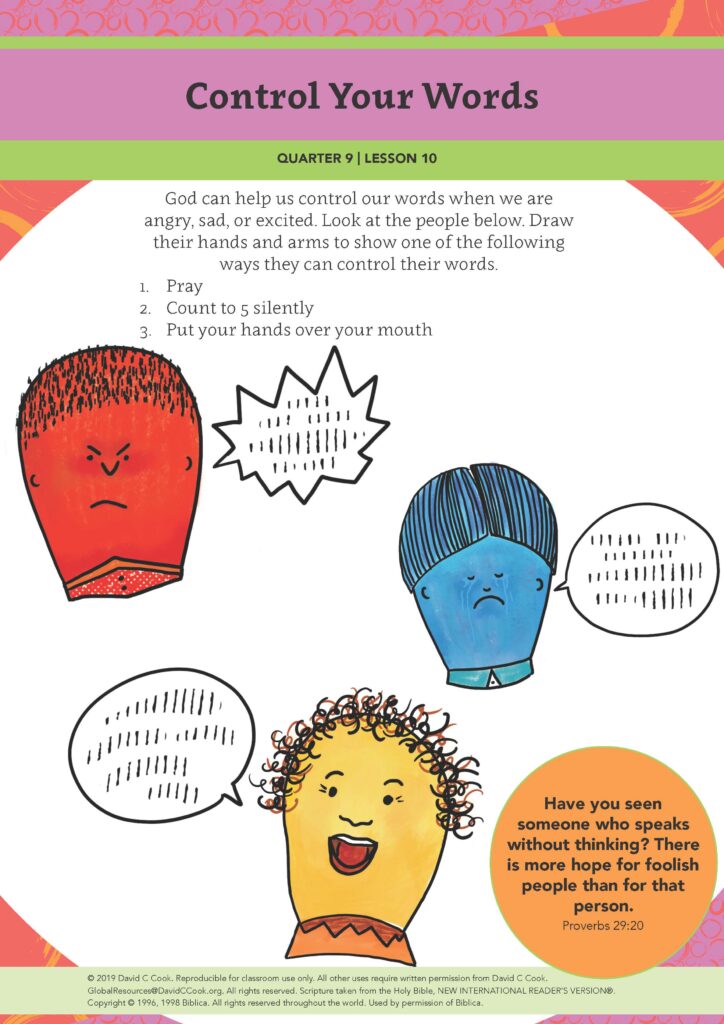During the lesson, the information for you to know is written in regular type, and what we suggest speaking or reading aloud to children is in bold. All resources for this lesson, including the Teacher Guide, Student Page, Family Connection Card, and other resources can be downloaded in a ZIP file by clicking on the following link:
In some lessons you will find "resource articles." These are articles written by experts from around the world to help equip you for your work with children and adolescents. Share them with parents or guardians if you consider it appropriate.
Have you seen someone who speaks without thinking? There is more hope for foolish people than for that person.
Proverbs 29:20
Have you ever said something and then wished you could take back the words you just said? It may have been the look of pain, anger, or shock on the face of the listener that caused you to regret your careless or angry words. Or it may have been the guilt or embarrassment you experienced as you remembered the discussion in your head again and again. We know that words can hurt. Words used as weapons damage relationships. Words spoken thoughtlessly harm reputations. Words spoken without self-control rarely bring good things into our lives.
The next time you are tempted to speak without thinking, remember that you worship the One True God who spoke the whole world into existence. His righteous words bring hope, love, peace, justice, and mercy. Pause and ask Him to guard your mind and your mouth and to fill them with words that encourage other people and words that bring glory to His great name. When you learn to speak with self-control, you can become a source of hope instead of a source of discouragement.
Encourage families to play a game to practice self-control. Have them name 2–3 exciting situations, such as having a visitor come, starting school, etc. Have 1 family member respond to each, and then have the other family members decide whether the responses show self-control.
Teacher Tip: If possible, email or text the Family Connection Card to the families of your students.
Greet the children as they arrive. Greet some by speaking loudly as though you are very happy and having trouble controlling your excitement. Greet others by speaking quietly and calmly, but be sure to welcome them warmly. This will help to introduce the children to the idea that the way we speak can affect others.
When you came to class today, I greeted some of you using my very loud voice. If I greeted you this way, how did it make you feel?
I greeted others more quietly. If I greeted you this way, how did it make you feel?
As you can see, the ways I speak and act can have an effect on you! Those of you who were greeted with a loud voice may have felt happy that I was so glad to have you in class today. Or, it may have made you feel uncomfortable because I was talking so loudly. Those of you who were greeted with my softer voice may have felt as though I was not as happy to see you. Or, you may have felt glad that our class is a safe and caring place to be.
I am very happy to see all of you! I am very happy that our class is a safe and caring place. Let’s start our class with a fun game.
Divide the children into 2 groups, and have the groups line up so that the first children in each line are facing each other. You will stand between the first child in each line.
I will share a special message with the first child in each line. When I tell you to start the game, that child will turn to the next person in line and whisper the exact words I said as quickly as possible. Then that child will whisper the words quickly to the next child. We will continue to do this until the message reaches the last child in the line. That child will shout out the message as loudly and as quickly as possible.
Quietly share a silly message with the first child in each line. Speak quickly, and do not repeat the message. You can use a statement from the list below or create your own silly message.
After both lines have shouted out the statement, ask each of the students at the end of the line to repeat the statement more slowly in a regular voice. It is likely that they will say something that is quite different from the original statement.
Let’s see what might happen if we said the statement more slowly. This time, the last person in the line will not repeat the statement until I tell you it is time.
Have the first and last children from each line go to the middle of their lines so there is a new first and last child in each line. Then share a different statement with the first child in each line. Speak quietly but slowly and clearly as you share the message. Tell the children to begin, and have them pass the message through the line in the same way as before, this time speaking quietly and slowly. When the message reaches the last child in both lines, have these children say the statement together, calmly and slowly. The statement will probably be close to your original statement.
When we used our excited voices, it was difficult to understand what others said. But when we spoke calmly and more slowly, it was much easier to understand. This is how we can speak with self-control. Even though we were excited and playing a fun game, we needed to speak carefully to be sure our message was understood. Let’s learn more about using self-control when we speak.
Let me tell you a true story from the Bible about a woman who used self-control with her words. Listen carefully as I tell you the story. Every time I say the woman’s name, “Esther,” you will put both of your hands over your mouth. This will show us Esther used self-control with her words.
Esther’s name is underlined in the story below. Pause briefly for the children to cover their mouths each time you read her name.
In the Old Testament in the Bible, God’s people—the Jews—were forced to leave their homeland to go live in the country of Persia. Esther was a young Jewish woman living in Persia. Her parents had died, so she lived with her cousin Mordecai. It was during this time that the king of Persia decided to gather the most beautiful young women so he could choose 1 to be his wife.
One of the young women brought to the palace was Esther. Esther’s cousin Mordecai told Esther that she must not tell anyone that she was Jewish.
Optional: If possible, show the image from The Action Bible.

What would you do if you Esther?
Allow 2–3 children to respond.
Esther chose self-control with her words. Esther obeyed Mordecai and did not tell anyone that she was Jewish. After some time had passed, the king chose Esther to be his new queen and held a great feast in her honour.
Soon after, Mordecai heard some of the king’s guards making a plan to kill the king. Mordecai told Esther what he had heard.
What would you do if you were Esther?
Allow 2–3 children to respond.
Esther chose self-control with her words and told the king about the plan to kill him. Choosing self-control also means knowing when it is important to share information with others and when not to share information. You should always tell someone you trust if you are in danger or if you think someone else may be in danger.
Some time later, one of the king’s important advisors made a plan to kill all of the Jews in Persia. Mordecai told Esther about this plan. He told Esther to ask the king to help the Jewish people. But even though Esther was the queen, Esther was not allowed to talk with the king anytime she wanted to. Esther had to wait until the king asked her to go to him. If she did not honour the king by waiting for him to invite her to speak, she could be sent away or even killed.
What would you do if you were Esther?
Allow 2–3 children to respond.
Esther chose self-control with her words again! Esther dressed in her royal clothing and stood in a place where she knew the king would see her. When the king saw Esther, he was glad. He asked Esther to come to see him. The king told Esther he would give her whatever she asked for.
What would you do next if you were Esther?
Allow 2–3 children to respond. They will probably say that they would have told the king about the plan to kill the Jews and asked for his mercy.
Optional: If possible, show the image from The Action Bible.

Reminder: All resources are available for download at the end of this lesson.
Esther chose self-control with her words again. Esther did not tell the king about the plan right away. Instead, Esther invited the king to a special dinner. The king was very pleased with the dinner. Again he said that he would give Esther anything she asked for. Listen to what she asked for.
Read the verse shown in this lesson directly from your Bible.
Your Majesty, I hope you will be pleased to let me live. That’s what I want. Please spare my people.
Esther 7:3
When the king found out about the plan to kill the Jews, he was very angry. He allowed the Jews to fight against the people who came to kill them. The Jews won the battle, and the Jews were honoured everywhere in Persia as well as in other nations.
Tell the children they may stop covering their mouths when they hear the name Esther.
Do you think this story might have been different if Esther had not chosen self-control? Why or why not?
If Esther had not obeyed Mordecai, she might never have become the queen. If Esther had not been wise in the way she told the king about the plan to kill the Jews, he might not have showed mercy. Because Esther chose self-control in her words, she was able to save her people.
Optional: If you are using The Action Bible, allow the children to read part of Esther’s story on pages 516-519 and 522.
Listen to what the Bible tells us about speaking with self-control.
Have you seen someone who speaks without thinking? There is more hope for foolish people than for that person.
Proverbs 29:20
Why do you think it is important to think before you speak?
Allow 2–3 children to respond. If the children do not mention the following ideas, share them: If you think before you speak, you are less likely to say something you regret or to say something in anger. You will also be more likely to communicate your thoughts clearly.
We can choose self-control with our words. Here are some ideas to help you:
Have the children pair up for the next activity. Ask the children to put 1 hand on their hips. Have them walk around the teaching space and touch elbows with another child. The children who touch elbows will be partners.
Now let’s practice what we have learned. I will read a situation. After I do, you and your partner will pretend you are the people in the situation. As you talk about the situation, remember to use self-control in your words!
Optional: If you are using the Student Pages, give the children crayons. Read the directions to the children and give them about 3 minutes to complete the pages.

Another good way to choose self-control with our words is to ask God for help. Our memory verse reminds us that when we feel frustrated, angry, or even too excited to speak with self-control, we can ask God to help us.
Read the memory verse from your Bible.
God gave us his Spirit. And the Spirit doesn’t make us weak and fearful. Instead, the Spirit gives us power and love. He helps us control ourselves.
2 Timothy 1:7

Repeat the verse and actions for the verse 3 times.
This verse tells us that God helps us with self-control. We do not need to do it on our own! God will help us to think before we speak and to use our words wisely, just as Esther did.
End class by saying this blessing, based on Proverbs 29:20, over the children.
Blessing: May you think before speaking and choose to use self-control with your words. May God fill you with words of wisdom, truth, encouragement, and love that others want to hear.
Lead the children in singing this quarter’s song, if possible.
Life on Life ©2020 David C Cook. Reproducible for home or classroom use only. All other uses require written permission from David C Cook [email protected]. All rights reserved.